Happy Sunday.
It has been a very hot, if beautiful and sunny weekend here in New York. I’ve gotten caught up on email and work, and now I’m back in the process of cooking, testing, and cooking some more. It’s not the most ideal time of the year to have the stove and/or the oven on, but the creative juices are flowing, and that’s what matters.
Lots of interesting articles this week, as well as a few beautiful standout recipes from blogger friends.
Recipes
Tis the season for sweet and crumbly berry scones! I love Jodi’s wholesome raspberry oat scones, which look to have just the perfect texture/crumb and feature my favorite type of berries. Use maple syrup or brown rice syrup in place of honey to make these delightful breakfast treats vegan.
My friend Kristy always delivers vegan food that is colorful, hearty, and which offers a new and creative spin on comfort food classics. This morning, I’m particularly intrigued by her chipotle cauliflower carnitas tacos, which feature a tangy green apple slaw and a flavorful spice rub on the roasted cauli. So bright and summery!
As most of you know, I’m a sucker for any recipe that features cashews, and Haley’s creamy cashew veggie noodle bowl is the latest to catch my eye! Brown rice noodles and veggies are simmered with a super rich, flavorful, sweet and salty cashew sauce. YUM.
Sometimes the best recipes are the simplest, especially during these long, hot summer days. I’m just loving Anya’s beautifully colorful marinated summer vegetables and beans over freekeh. I can’t say I use freekeh often enough, but it’s a lovely, nutty, and easy-to-cook whole grain. In this dish, it’s coupled with crisp, smoky summer vegetables and a touch of sriracha for heat.
I’m a great fan–personally and professionally–of vegan chef Anita Shepherd, so I was delighted to see her vegan chocolate birthday cake featured in a recent Food52 genius column. Anita uses avocado to make the cake itself rich and moist, and I can’t wait to try her version of vegan chocolate buttercream.
Reads
1. Some good news for Americans: for reasons that are not entirely clear to scientists and researchers, a number of major diseases, including colon cancer, dementia, and heart disease, are waning in wealthy nations, reports the New York Times. Cancer and heart disease remain leading killers, but they are striking later.
It’s difficult to say whether screening, treatment, or lifestyle change is at the heart of this shift; quite likely it’s a combination of all three. Gina Kolata’s coverage explores the possible factors involved and asks broader questions about how and why disease mortality can change between generations.
2. In an effort to raise awareness about air pollution and climate change, more than 800,000 students, government officials, and volunteers gathered in India’s Uttar Pradesh state on Monday to plant trees. They planted 49.3 million trees in only 24 hours–a tree-planting Guinness world record, even if it fell slightly short of their goal of 50 million. It’s an incredible effort and a meaningful act of hope.
3. As usual, Marion Nestle cuts through nutrition hype and misleading headlines with a balanced perspective. This week, she offered some clarity on butter (which, according to Time, is “back”). I appreciate her cautionary hype alert: “any time you read that science got it wrong, be skeptical. Maybe they did, but it’s more likely that the science is still incomplete.”
And indeed, the Time coverage has failed to put research in a meaningful and clear context. The reality is that butter (and other saturated fats), so far as we can determine, are still moderation foods. For more on this, you can also read reporting from The Center for Science in the Public Interest and Harvard’s School of Public Health.
4. The 2015 Dietary Guidelines for Americans have been published for some time now, and some of the controversy surrounding the failure of recommendations to reduce red meat consumption to be included in the final guidelines has abated. Still, one researcher–Stanford professor of medicine Randall Stafford–continues to take a stand.
In a letter to the Journal of the American Medical Association that was published on July 12, the preventive-medicine expert addressed the failure of the newest DGA to articulate the health and climate benefits of a low-meat diet. The Stanford Medicine News Center published a Q&A with Stafford, probing his mission in writing the letter and asking him some interesting questions about the benefits and urgency of a plant-based eating paradigm.
5. Finally, a smart and on-point article in Vox about the biggest challenges facing science today. Drawing on feedback from over 270 scientists, the article touches on such issues as industry funding, poorly designed studies, and failure to replicate study findings prior to publication. I think that point #6 — science is poorly communicated to the public — is especially important, especially within the nutrition world.
And that, friends, is that. I wish you a wonderful rest of your weekend, and I’ll have some new warm-weather vegan fare for you on the blog later this week!
xo
You might also like
Happy Sunday! It’s been a busy, hot week here in New York. I had a full weekend of recipe testing planned, but the plans changed on Friday when I had a little kitchen accident and ended up with a bunch of stitches in my right thumb (note to self: take better care with the mandolin slicer). Fortunately, it’s healing nicely, and I’ve managed to get a little cooking done in spite of things. I’m having a lot of fun testing recipes for the…
Happy Sunday! I hope you’ve all enjoyed nice weekends. I’ve been reveling in the autumnal weather; I’m so happy that my favorite season is here. To celebrate, here’s a mixture of delectable late summer and early fall food links, most of them of the breakfast variety. Because what’s better than a cozy breakfast on a cool morning? Nothing, I say. Warm with a bowl of creamy coconut millet porridge. This looks absolutely delightful. …and if you’re not quite ready for porridge, you can savor…
Happy weekend, all. I want to thank you for taking time to read and consider Emilia’s awesome green recovery story. If you haven’t seen it yet, I do recommend checking it out; it’s incredibly powerful. I’m still on a holiday recipe kick, so here are some of my additional Thanksgiving ideas: 3 entree ideas, two sumptuous desserts. For more inspiration, you can check out the Thanksgiving recipe roundup post that I compiled earlier this week! Kristy has veganized a perennial Thanksgiving favorite, green…
Happy Saturday, everyone. I’m happy to see that the slow cooker chili was a hit (a few folks have already let me know, via Instagram and FB, that they made it, and they seem to have loved it as much as I have). I’ll definitely be posting more slow cooker recipes in the coming year, as that kitchen appliance is quickly becoming a grad school lifesaver! (And I’ll always try to give a stovetop version of things, too). By the way, if you make…


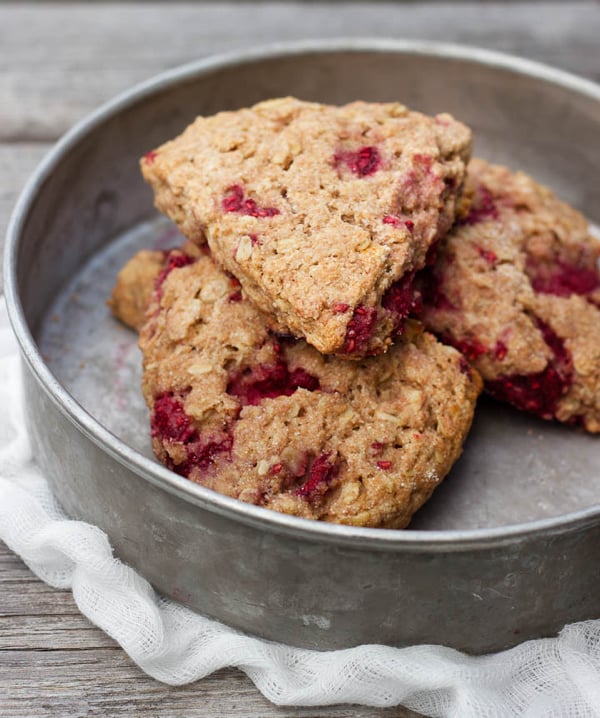
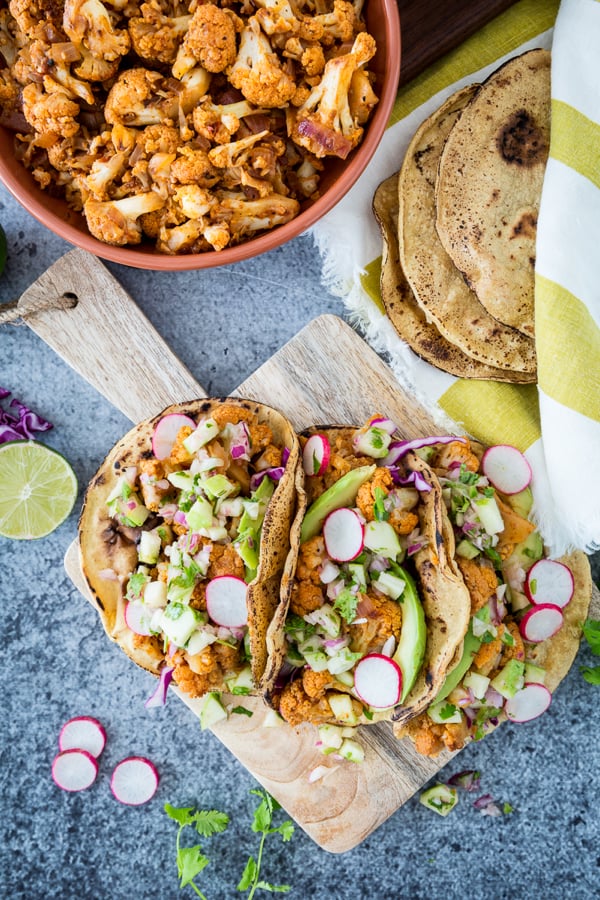
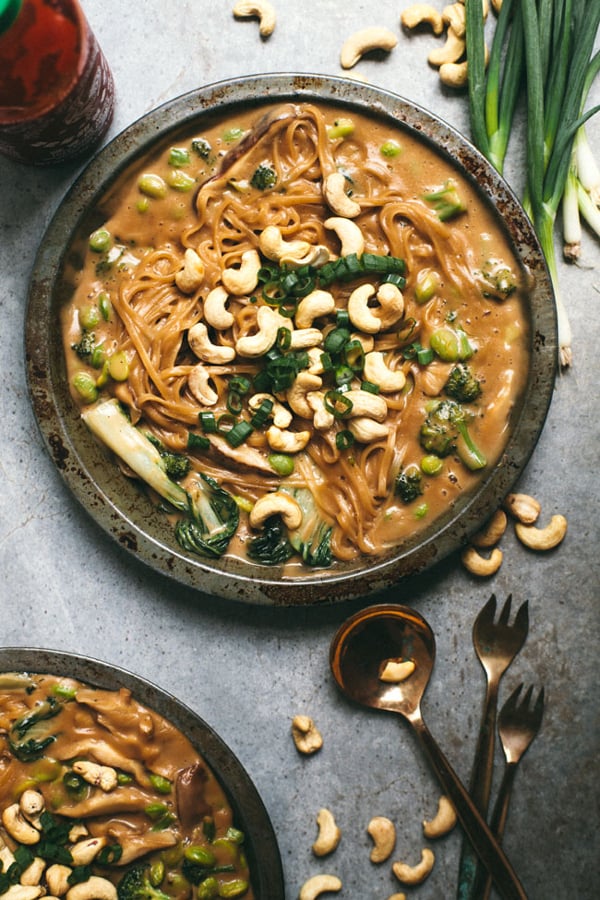
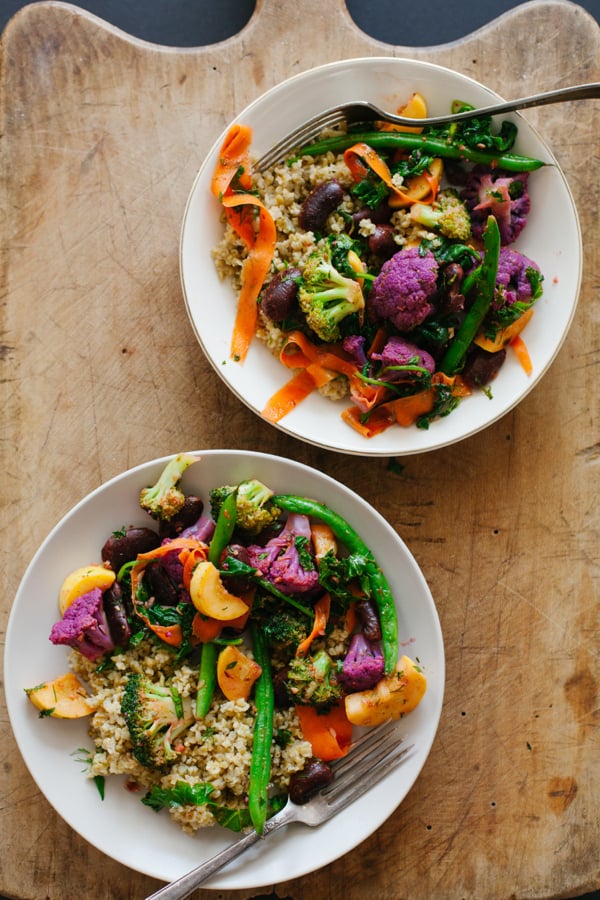
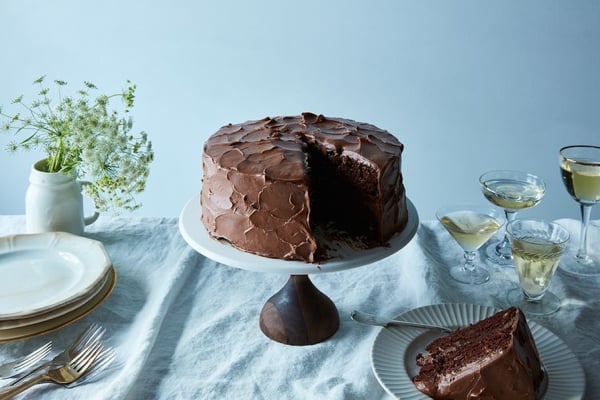
Leave a Comment
Love the post! The photos are just gorgeous and the recipes look delicious.Thank you for sharing them! Your blog is amazing!
Hi Gena!
To echo what Maria said, I am also enjoying Whole, and although I’m only a few chapters in, I feel that it has given me much perspective on scientific findings, especially when related to nutrition!
This discussion of the “best” diets (paleo vs . plant based vs. “low meat” etc. etc.) is one that perplexes me, and one I would love to get your feedback on in a blog post. There are findings these days that say sugar is the enemy, and others that say that plant based is the way to go (although I imagine plant based diets would inherently include more sugar, at least in the forms of sugary fruits). Most blogs pick a side and I know you would give your readers a more balanced explanation!
Thanks Amy! I look forward to checking out WHOLE.
To address your question, at least in a short answer kind of way, I try to stay away from “best diet” or “either/or” language about different diets, only because my feeling is that the evidence shows that there are many healthful ways to eat. Different cultures around the world have been thriving for centuries with drastically different macronutrient compositions and traditional foods and eating patterns. It seems to be true that many different approaches are possible, depending on circumstance, culture, availability, and so on; human beings are adaptable eaters.
Of course, we live in a world in which it’s important for health professionals to try to isolate the dietary patterns that seem most beneficial, based on the evidence we have. And that’s where this all gets tricky, because we debate what should be recommended in a world in which availability, for example, is no longer a major influence in dietary selection for a great many people.
My feeling is that there is very strong evidence for a Mediterranean style eating pattern and plenty of evidence for a plant-based diet. Taking ethics and environment into account, too, I think a plant-based diet is the one that best speaks to the combination of nutrition/health/disease prevention, environmental awareness, and compassion to animals.
On the whole, I think that the pieces of dietary wisdom that are the most meaningful address broad patterns and incorporate as much weight as evidence as possible–which is to say that they don’t seize on or sensationalize individual findings and they don’t tend to focus exclusively on single foods so much as eating patterns. They include telling folks to maximize consumption of fruits and vegetables, avoid trans fats and limit saturated fats, reduce sodium, reduce processed food consumption, and to cook homemade, fresh food whenever possible. I think it’s also important to emphasize regular meal times, balanced plates of foods, and to encourage satisfaction with meals so as to increase the pleasure one takes from eating.
I think sugar has been singled out lately for good reasons — there’s a lot of it lurking in processed foods, and thanks to the soda industry, it may be disproportionately impacting the health of young people in serious ways. But I don’t think sugar is THE problem in our food system, which is to say that I also think that we over-consume fats, salt, processed food, etc. And I think that all of those factors, as well as sedentary lifestyle and imbalanced eating habits, have played a role in the rise of type II diabetes and metabolic syndrome.
So, I resist the idea that our nutrition debates should all be boiled down to “plant-based vs. low sugar” because I don’t really think that such a dichotomy addresses the complexity of what’s going on. I advocate for plant-based because I think that a plant-based eating style offers numerous potential health benefits while also offering protection and respect to animals and to our planet. And I’d suggest moderation and vigilance with added sugars because that recommendation has been shown to offer health benefits, too–but not because I think all sugar (especially naturally occurring sugars) are inherently bad. Plus I’d say that moderation with other kinds of foods, including saturated fats, refined carbohydrates, high-sodium processed foods, and artificial sweeteners, is part of the big picture, too.
That turned into a ramble of sorts, but I hope it is at least partially answers your question!
G
Eloquent and informative as always, thank you for your thoughtful response!
Gorgeous collection of recipes and another wonderful reading list suggestion.
Thanks for sharing.
Kimberly
Thank you so much for linking to the marinated veggies, Gena 🙂
Bookmarked a lot of these reads, thank you for the inspiration.
HI Gena–loved the little article about all the trees planted in India, and, as usual, the food looked scrumptious. I would like to find a way to adapt that noodle bowl to much lower fat and I bet I can. For me, butter will never be back, and coconut oil won’t either. If I ate those fats in moderation I would be in a wheelchair, and that’s where I almost ended up for good when I did. But, like the excellent article about the problems in science, I don’t know how to “argue” that in the current climate. I am glad there is some “soul searching” going on about how scientific research is conducted and funded–it’s much needed. T. Colin Campbell did an excellent job of that in his book Whole, which was largely ignored by mainstreamers. But I thought it was brilliant. It’s sad, though, too, to read that grad students in the sciences actually now have all the same kinds of problems grad students in the humanities had before they did. There’s something deeply wrong with all this money stuff and I’m glad we’re starting to look at it. Okay I better quit, I will just rant more. Thanks for a thought-provoking line-up!!
Hi Maria,
Thanks for the tip about WHOLE! It’s a book that was on my radar, but it was published when I was in the middle of my post-bacc, and like many of the books I was eyeing back then, I never got to read it when it came out. I’ll need to revisit.
I agree that the current science research climate is very problematic. I am glad that Vox continues to be vocal about the need for replicability and the issues associated with sensationalizing the results of small (sometimes outlying) studies. But as for the bigger issues of industry and money and funding…well, I don’t have answers, but I agree that looking at it is the least we can do.
G
Oh, and i hope to adapt that raspberry oat scone recipe too! Yummers. 🙂 xo
Hey Gena! I don’t know if you monitor your ads at all, but there was an ad for meat that had banners all through this post. Just thought you should know!
Hey Liz!
I do. I’ll let my network know that these came up for you — thanks for the head’s up.
G
Aw thanks for sharing my scones here, Gena! I’m so happy they caught your eye 😉 That vegan-avocado chocolate cake had me drooling over breakfast this morning – like whoah. Hope the sunshine continues for you this week – sending love x
Sending love back, Jodi!
I look forward to this round-up SO much each week. Your mix of articles always impresses me!
The decrease in major disease, especially the acknowledgment that we aren’t sure why, reminds me of when the US had it’s lowest rate of teen pregnancy a few years back and public health professionals were like, “this is great but we don’t totally get it but we’re so happy!” It’s equal parts humbling IMO and frustrating – after all how can we replicate results if we don’t know what’s happening!?
It’s particularly poignant juxtaposed with the piece on butter. I feel like the theme this week is “science, and especially scientific reporting, isn’t always right so be critical consumers.”
Lastly, the article about the biggest problems in science are SO spot on. And fucking depressing. And while I’m glad they looked at gender, I’d have liked to see more of a nuanced discussion on the topics covered (although I admit I skimmed this rather than read it in-depth so I may have missed something). For example, sexual and reproductive health research is notoriously underfunded more so than other work. And when Congress became majority conservative, threats to funding were significantly more than other disciplines – and often inadvertently harmed the most vulnerable study populations (eg sex workers). Public health as a whole took a big hit and SRH did even more.
xo
Such a great point about the funding for sexual/reproductive health research, Kait, and I have to imagine that it is true for other fields of study (especially those that disproportionately impact minority groups) as well. Of course, no article can be perfectly comprehensive, and on the whole I like what I find at Vox because I do think the site tries hard to speak up for balance and integrity and start a conversation about flaws within scientific fields. But there’s always a need for the conversation to go deeper, push harder, and not allow major inequities to go unnoticed or unheeded. Thanks for your insight, as always.
Great recipes and reads as always! On the topic of fat I am wondering if you could address in a future post the coconut oil/butter etc craze? My instinct is that they too fall in the moderation food category but would love to hear your thoughts!
Cheers to increases productivity post-Denver!
Hi E,
It’s a well-timed question!
I actually mentioned in a recent weekend reading roundup that I consider it to be a moderation food — which is a departure from my liberal use of it in the past, and the result of my ongoing nutrition studies. There is good evidence that coconut products are hyperlipidemic — to a lesser extent than saturated animal fats, to be sure sure, and one might argue that there’s some room for the saturated fats in coconut oil within a plant-based diet because saturated fat tends to be limited overall. But I don’t consider coconut oil to be an everyday cooking oil. For that, I recommend olive, avocado, canola, grapeseed, safflower, etc. I do love coconut oil in baked goods and coconut milk in curries and soups, but on the whole I’d say it’s a now-and-then food, rather than an everyday staple food.
My two cents 🙂
G
Thank you! This echoes my thinking exactly (minus the whole actual nutritional studies piece!).